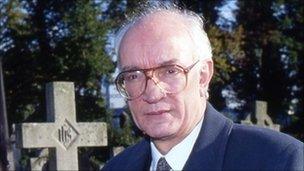Coroner calls for computer simulations of RUC killings
- Published

Computer simulations could shed new light on so-called shoot-to-kill deaths an inquest heard on Friday.
Coroner John Leckey is seeking a reconstruction of the killing of two suspected republicans by police near Armagh almost 30 years ago.
The coroner also wants a virtual recreation of the fatal shooting of a teenager at a hay shed in 1982.
He told the Belfast inquest pre-hearing he had contacted firearms expert Dr Graham Renshaw about the matter.
"Dr Renshaw would like to hear from those at first-hand and also from the members of the security forces," he said.
Mr Leckey plans inquests into the deaths of teenager Michael Tighe, shot dead by the Royal Ulster Constabulary (RUC) at a hay shed near Craigavon, County Armagh, in November 1982, where rifles were stored, and suspected INLA men Roddy Carroll and Seamus Grew, shot dead near Armagh in December 1982.
The government has always denied any "shoot-to-kill" policy existed and has resisted calls from families to look again at what happened.
Sir John Stalker, former deputy chief constable of Greater Manchester Police, was brought in to investigate. He was later replaced by Colin Sampson, chief constable of West Yorkshire Police.
Friday's inquest heard from a barrister for those killed that Martin McCauley, who was shot and injured at the time of the death of Mr Tighe, was willing to co-operate with the hearing.
The permission of the owner of the hay shed is also to be sought and Dr Renshaw will need to examine all documents, photographs and maps.
'Deficient'
Mr Leckey is also probing the deaths of Sergeant John Quinn and Constables Alan McCloy and Paul Hamilton.
The three RUC officers were killed by an IRA bomb which exploded beneath their armoured police car.
They were investigating a report of a robbery in Lurgan near Belfast when the bomb exploded.
Mr Leckey said Attorney General John Larkin QC decided this month to order a fresh inquest.
The coroner added the original hearings in 1983 were deficient by modern standards.
"No criticism of the coroner is intended as he was governed by jurisprudence and procedures that were very different to those applying today," he said.
"The coroner had not been fully appraised of all the relevant evidence pertaining to the tragic circumstances in which the three police officers lost their lives."
Counsel for the families have not been paid because of a wrangle with the Legal Services Commission.
Barrister Karen Quinlivan said: "It is not reasonable, I have to say, that coronial hearings should go ahead where the next of kin don't have proper representation."
Mr Leckey has raised the matter with the commission. He said he thought six weeks' notice given of Friday's hearing would have allowed time for fees to be resolved.
"These incidents are so well-known that the Legal Services Commission, you would like to think, has a good grasp of the sort of issues that are involved," the coroner added.
- Published12 April 2010